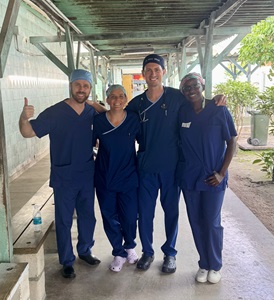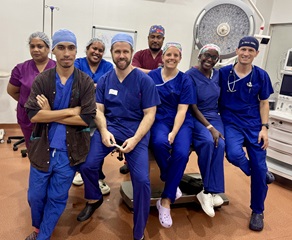2025 | Volume 26 | Issue 5
Earlier in July, a volunteer surgical team, led by urologist Dr Rick Catterwell, FRACS, was deployed to Kiribati under the Pacific Clinical Services and Health Workforce Improvement Program (PCSHWIP). This regional initiative is funded by the Australian government through DFAT and coordinated by the RACS Global Health team. The program aims to strengthen specialised clinical services and build resilient health workforces across Pacific Island countries (PICs). The focus is on collaboration, mentorship, and sustainable capacity development.
This deployment demonstrated the program’s goals—delivering direct surgical care, mentoring local clinicians, and fostering long-term professional networks. Over the course of the week, the team saw more than 60 patients in clinic and performed 21 urological procedures, addressing a range of conditions including benign prostatic hyperplasia (BPH), urinary stone disease, penile cancer, paediatric undescended testes and urethral strictures.

L to r: Dr Catterwell, Lauren, Dr Wilson, Fredlin
Leadership and collaboration in Kiribati
Along with Dr Rick Catterwell—whose commitment to global health is both professional and deeply personal—the surgical team consisted of anaesthetist Steve Wilson, theatre nurse Lauren Krieg, and ward nurse Fredlin Kiman. Together, they worked closely with the local surgical team, including Head of Surgery, Dr Kabiri and registrar Uriam Salomia, to deliver care and build clinical capacity.
“In my experience, this was the most rewarding clinical week in the year, and I highly recommend it,” Dr Catterwell said of the deployment.
A journey rooted in purpose
Dr Catterwell’s path to medicine was shaped early by his parents’ example of hard work and perseverance. Drawn to the people side of medicine, he found meaning in connecting with patients and making a difference in their lives.
After completing his medical studies at the University of Adelaide, Dr Catterwell has pursued Fellowships in India, Malaysia, and the UK. His passion for travel included a sabbatical early in his medical career backpacking across Southeast Asia, Europe, and South America, where at one point he focused on mountaineering, climbing several 6000-metre peaks. “At first, it was to challenge myself and prove I could physically do it. But after I'd done one, I decided to do another two, and realised if you put in that additional bit of effort, you get a huge reward."
That insight led him back to surgery and urology—disciplines that demand precision, resilience, and focus. “Surgery requires constant risk assessment for your patient. With climbing, the risk is yours alone—it’s refreshing in a different way.”
A legacy of service
Dr Catterwell’s commitment to global health is also profoundly personal. His grandfather, a WWII soldier, survived behind enemy lines in Papua New Guinea thanks to the help of local people. “If he hadn’t, I wouldn’t be here,” he said. That connection inspired a desire to give back.
In 2023, a conversation introduced him to RACS Global Health, leading to his first deployment to Tuvalu. This year, he returned as team leader on deployments to both Micronesia and Kiribati. Each mission brought challenges—and ingenuity.
“In Tuvalu, most of the work our urology trips focused on involved bladder outlet surgery, particularly transurethral resections of the prostate,” Dr Catterwell says. “When we arrived, they didn’t have a foot pedal—an essential part of the operation. In a moment that felt straight out of MacGyver, we reverse-engineered a diathermy pen to function as a foot pedal. And it worked!”

The RACS Global Health team with a patient
In Kiribati, Dr Catterwell and his team focused on male patients with urinary symptoms indicative of benign prostate enlargement, a condition they were equipped to treat surgically. Several patients with complex urethral stricture disease were identified as candidates for specialist urethroplasty, potentially during future visits. The team noted a high prevalence of urinary stone disease, likely linked to climate and water access, suggesting a role for local training in stent insertion. Medical management options for BPH and overactive bladder were limited. While tamsulosin was available, the team planned to support an application for combination therapy with dutasteride, which has been shown to significantly reduce disease progression.
Additionally, the introduction of oxybutynin was recommended to improve quality of life for patients with bladder overactivity.

The RACS Global Health team with the Kiribati team
Collaboration and capacity building in Kiribati
In Kiribati, the team’s work was warmly received. “It was special to go in with people that were as invested as I was.” Dr Catterwell praised the local surgical team for their enthusiasm and commitment to learning. Interactions with patients were a highlight, and the collaborative spirit of the host team made the experience especially meaningful.
Sharing knowledge, building networks
Reflecting on the broader impact of the program, Dr Catterwell emphasised the importance of mentorship and knowledge-sharing. “We’ve all worked hard to gain these skills. A network of mentors helps democratise knowledge, so people in our region can access expertise—even from afar. To share what we know, build networks, and help those who might otherwise struggle to access care—that’s one of the most rewarding things you can do.”